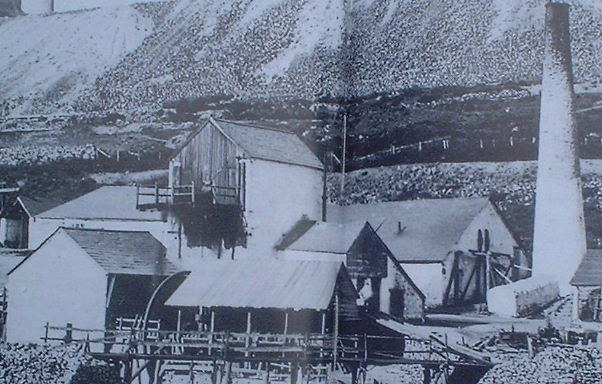Stamp Engine
SX264698
|
|
Stamp Engine SX264698 |
|
|
The
remains of the Stamp
engine house exist just above the Seaton valley bottom amongst
the dressing floors .It
powered a set of 24 headed stamps on the Southern side of the flywheel
and a rotative crusher
to the North. These crushed the ore for dressing prior to further treatment
on the floors that lay on the valley bottom . A tramway system linked the
many shafts with the plant and with other parts of the processing area.
Stones of the left hand pile are the remains of a rotative crusher
plant. The substantial concrete structure on the right is the remnant of
a screen used in the reworking of the mine waste in more recent years.
The crusher
was probably used for bucking
of the ore, a process that crushers started to mechanize from the 1830's
onwards.
|
||||
The engine was of 28 inch diameter and powered a 24 head of stamps.This diagram shows the layout of the Stamp engine complex as suggested by CAU based on Ordnance survey maps. No boiler house can be seen in this photograph immediately behind the Engine house where the CAU study suggests it should be.It was common for stamp engines to have its boiler houses in this position in order to release the room in front and to the sides for heads of stamps. A lean
building to does exist on the side nearest the camera and a long low building
lies across the track next to the chimney, perhaps one of these was the
boiler house?
|
 The Picture above is a close up taken from a photograph taken from Caradon & Looe The Canal, Railways and Mines by Michael Messenger Click on the photograph for a wider view. The picture below shows the stamps engine with its flywheel driving a crusher on the left and the set of stamps on the right. |
| No
public right away exists to any of the mine sites visible from this footpath.
On many mine sites in Cornwall dangers may still exist, many hidden. This web site is published as a resource to those using the public right of way. |